Colloquium Highlights Consideration of Context Over Memorization of Dates
Published 11.19.2014
News
Events
Faculty & Staff
Individualized Programs of Study
School of Sciences, Humanities & Visual Communications News
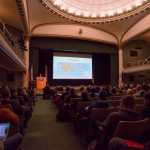
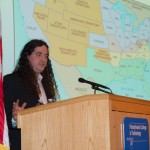
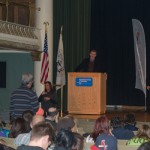
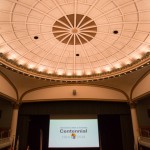
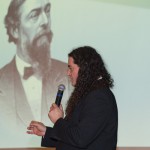 Defining history as a "conversation between the past and the present ... and almost always about the future," faculty member Craig A. Miller delivered the concluding lecture in Penn College’s Centennial Colloquia Series on Tuesday night. The assistant professor of history and political science discussed “Technology, Power and Responsibility” in the Klump Academic Center Auditorium, engaging his audience the same way he challenges his students: "I'm not here to teach you history. I'm here to use history to teach you to be critical thinkers." So while the presentation was shaped around the construction of the transcontinental railroad, that story served as a thought-provoking springboard to the broader connection between choices and consequences. Cross-country rail service was "truly a technological marvel" steeped in progress and industrial speed, he said, a monumental achievement that was not without fallout. True, it ushered in an era of development and helped the United States become a global economic power. But the territorial expansion also relocated Native Americans under a policy of "assimilate or move," fostered financial chicanery and altered the workforce. In an informed give-and-take, Miller urged attendees to vigilantly weigh multiple perspectives, to logically and critically analyze the societal price of decisions, and to "accept uncomfortable truths and learn from them." The hourlong program, introduced and moderated by Paul L. Starkey, vice president for academic affairs and provost, was followed by a question-and-answer session and a reception in Wrapture.
Defining history as a "conversation between the past and the present ... and almost always about the future," faculty member Craig A. Miller delivered the concluding lecture in Penn College’s Centennial Colloquia Series on Tuesday night. The assistant professor of history and political science discussed “Technology, Power and Responsibility” in the Klump Academic Center Auditorium, engaging his audience the same way he challenges his students: "I'm not here to teach you history. I'm here to use history to teach you to be critical thinkers." So while the presentation was shaped around the construction of the transcontinental railroad, that story served as a thought-provoking springboard to the broader connection between choices and consequences. Cross-country rail service was "truly a technological marvel" steeped in progress and industrial speed, he said, a monumental achievement that was not without fallout. True, it ushered in an era of development and helped the United States become a global economic power. But the territorial expansion also relocated Native Americans under a policy of "assimilate or move," fostered financial chicanery and altered the workforce. In an informed give-and-take, Miller urged attendees to vigilantly weigh multiple perspectives, to logically and critically analyze the societal price of decisions, and to "accept uncomfortable truths and learn from them." The hourlong program, introduced and moderated by Paul L. Starkey, vice president for academic affairs and provost, was followed by a question-and-answer session and a reception in Wrapture.